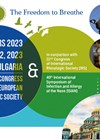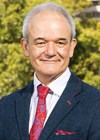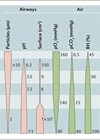For the three plenary sessions at ERS 2023, we asked top leaders in the field to enlighten us in the general aspects of our profession that need attention. Prof Gil Siegal will discuss the ethical questions we encounter in our daily practice.
The need to direct our practice in an ethical manner is clear. It is also easy to agree that healthcare providers are generally good-hearted, conscious persons. If this is the case, why is ethics a constant worry for practitioners, managers, patients and their families? What is lost in translation between the ethical imperative and daily uncertainties in respect to the appropriate course of action?
To answer this query, one needs to ‘mind the gap’ between abstract concepts such as the principle of biomedical ethics [1] (e.g. respect for autonomy, the sanctity of life, justice, or solidarity) on the one hand, and the daily challenges that constantly evoke ethical concerns on the other hand. As ‘ethics’ attends somewhat intangible/theoretical concepts (“cruising at 30,000 feet”) [2], ‘conduct’ analysis serves to denote a practical look at prevalent issues that represent a dilemma to be resolved in real life. On the outset, by referring to ‘dilemma’, I am describing the need to sort competing justifiable values and interests that necessitate identification, resolution, and action. Achieving a conduct that meets your personal standards and peers’ values is key. Clearly, being a good person does not alleviate the professional need to choose between two or more compelling, yet different or even opposite, courses of action.

A surgeon detects tissue protruding from the sphenoid area behind a curved septum (that precluded its identification prior to surgery) during a routine septal surgery. The patient was not informed about the possible need for sinus surgery and no CT scan was ordered, as is the common practice for isolated septal deviation surgery. In this case, various ethical principles can lead in different directions - to name a few: autonomy (respect patient’s choice to decide and consent to all stages of the surgery); utilitarian (the OR is a public resource and re-operating removes an OR slot that could be used for another patient); beneficence (properly remove that polyp for cytologic examination and improve your patient’s health); preventing harm (to avoid such a case, should I routinely order all my SMR patients a CT scan, thereby exposing all of them to CT radiation and the resulting overall cost to the NHS?).
"Too many times we fail to realise we are indeed involved in a situation that represents an ethical dilemma"
In ‘identification’ I pinpoint the first double obstacle in achieving your ethical goals. First, too many times we fail to realise we are indeed involved in a situation that represents an ethical dilemma. This can explain instances in which peers’ conduct seems inexplicably unsound. Second, we might overlook the genuine motivations influencing our decisions and the resulting course of action. Consider the following case:
A patient comes to see you for a second opinion. You notice that her previous surgery failed to address the upper part of the ethmoid sinuses, hence her partial anosmia. Should you inform her [3]? Would your answer differ if she was operated by a close friend? Why [4]? When will you decide to inform others about these findings? Who will be so informed – the surgeon? Her supervisor? Her employer? The medical board? If you were the original surgeon, would your answer/s change?
Clearly, exploring the competing principles will require an awareness to what is at work on part of the decision-maker (rational as well as behavioural biases) [5] and, once exposed, a resolution and action can promote appropriate conduct.
SEE ALSO
In this regard I strongly believe that, as with cracking an egg, there is more than one possible solution to many of our conduct dilemmas. Therefore, I am more concerned with the process each healthcare provider should employ than with the [end] result of doing A over B. Now, if we realise that the process is the cornerstone of proper conduct, it becomes apparent that, as with any other process we attempt to master, it requires continual attention and practice. This includes constant deliberations with peers as well as with conduct/ethics experts (discussing on a regular basis such as during clinical rounds, weekly/monthly presentations of cases that invoked conduct dilemmas or plenary sessions in conferences and meetings) and personal leadership to signal to trainees, peers and patients a strong commitment to improve conduct in face of constant dilemmas. Expected outcomes might include more nuanced/specific guidelines and protocols, standardisation, and lessened risk for complaints, confrontations and ensuing legal or disciplinary measures.
"I am more concerned with the process each healthcare provider should employ than with the [end] result of doing A over B"
It is worth mentioning that constant practice leads to better decision making, and this is especially true in case of acute or unexpected crisis – instead of being surprised, pushed to a decision or ignoring the event altogether, practice will steer a better-educated response and mobilise peers to help sort out the dilemmas invoked.
Finally, all providers aim at acting in a professional way, therefore adding professionalism to the list of ethical obligations. Such a stance seems to provide another layer of defence to their choices and conduct, as ‘this is the way I should act/respond’. I can accept that, under the understanding that professionalism indicates the way a professional body arranges its metrics for behaviour in a manner that is self-centred, self-imposed and/or regulated. However, the transparent age we live in precludes an isolated, internal standard. To the contrary, the current sentiment expects professional groups to absorb external social needs and expectations as legitimate vectors in the overall conduct of a professional group, including healthcare providers.
Indeed, the right way to regard ethics and conduct (and to conclude this article) is to highlight that practising the conduct process and acting in a way that meets conduct standards carries many benefits, including the ability to answer to professional critique and/or public scrutiny; the prospects of enhanced credibility entrusted on you by patients and their families, as well as from your peers; and maintaining that inner beacon that brought us all to become caregivers – being a good person and an ethical professional in a complex environment.
References
1. Beauchamp T, Childress J. Principles of Biomedical Ethics: Marking Its Fortieth Anniversary. Am J Bioeth 2019;19(11):9-12.
2. Magelssen M, Pedersen R, Førde R. Four Roles of Ethical Theory in Clinical Ethics Consultation. Am J Bioeth 2016;16(9):26-33.
3. Gallagher TH, Bell SK, Smith KM, et al. Disclosing harmful medical errors to patients: tackling three tough cases. Chest 2009;136(3):897-903.
4. Cox CL, Fritz Z. Should non-disclosures be considered as morally equivalent to lies within the doctor-patient relationship? J Med Ethics 2016;42(10):632-5.
5. Tversky A, Kahneman D. the framing of decisions and the psychology of choice. Science 1981;211(4481):453.










